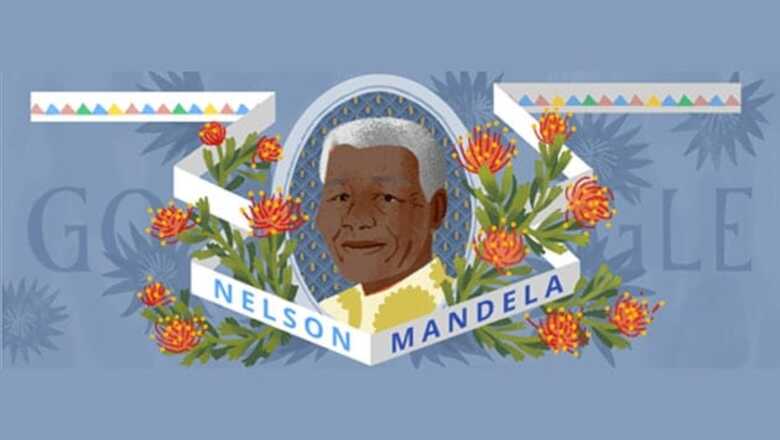
views
New Delhi: To commemorate Nelson Mandela's 96th birthday, on July 18, Google is posting an interactive doodle celebrating the life of the anti-apartheid icon, who also served as President of South Africa.
The doodle takes us on a visual journey through Nelson Rolihlahla Mandela's life interspersed with six of his most memorable quotes that users can also share on social networks.
Globally respected as a symbol of resistance against injustice, Nelson Mandela brought an end to the much-despised apartheid regime in South Africa while spreading the spirit of freedom in the rest of Africa.
The six quotes featured in the Google doodle are:
"No one is born hating another person because of the colour of his skin, or his background, or his religion."
"People must learn to hate, and if they can learn to hate, they can be taught to love, for love comes more naturally to the human heart than its opposite."
"For to be free is not merely to cast off one's chains, but to live in a way that respects and enhances the freedom of others."
"Education is the most powerful weapon we can use to change the world."
"The greatest glory in living lies not in never falling, but in rising every time you fall."
"What counts in life is not the mere fact that we have lived. It is what difference we have made to the lives of others that will determine the significance of the life we lead."
Incarcerated for 27 years through much of his youth, Mandela became the first-ever elected black president of his country, ushering in multi-racial democracy replacing the whites-only rule.
Inspired by Mahatma Gandhi's principle of Ahimsa, especially his campaign in South Africa itself during his days as a lawyer, Mandela also preached against violence though the struggle against the apartheid regime was marked by violent incidents.
The Nobel laureate was one of the world's most revered statesmen and was awarded the Bharat Ratna, India's highest civilian honour in 1990.
Mandela, who had been suffering from a recurring lung infection, died on December 5, 2013 following a prolonged spell of ill-health.
His charisma, self-deprecating sense of humour and lack of bitterness over his harsh treatment, as well as his amazing life story, partly explain his extraordinary global appeal. Mandela's crusade against the apartheid regime of South Africa, has often drawn a parallel with Mahatma Gandhi's fight against the British rule in India.
Mandela was born in 1918 into the Xhosa-speaking Thembu people in a small village in the eastern Cape of South Africa. He was often called by his clan name - "Madiba". Born as Rolihlahla Dalibhunga, he was given his English
name, Nelson, by a teacher at his school.
His father, a counsellor to the Thembu royal family, died when Mandela was nine, and he was placed in the care of the acting regent of the Thembu people, chief Jongintaba Dalindyebo.
In 1941, aged 23, he ran away from an arranged marriage and went to Johannesburg. Two years later, he enrolled for a law degree at the mainly Afrikaner Witwatersrand University, where he met people from all races and backgrounds.
He was exposed to liberal, radical and Africanist thought, as well as racism and discrimination, which fuelled his passion for politics. The same year, he joined the African National Congress (ANC) and later co-founded the ANC Youth League.
He married his first wife, Evelyn Mase, in 1944. They were divorced in 1958 after having four children. Mandela qualified as a lawyer and in 1952 set up South Africa's first black law firm with Oliver Tambo.
In 1956, Mandela was charged with high treason, along with 155 other activists, but the charges against him were dropped after a four-year trial. Resistance to apartheid grew, mainly against the new Pass Laws, which dictated where black people were allowed to live and work.
In 1958, Mandela married Winnie Madikizela, who was later to take an active role in the campaign to free her husband from prison. The ANC was outlawed in 1960 and Mandela went underground. Tensions with the apartheid regime grew, and soared to new heights in 1960 when 69 black people were shot dead by police in the Sharpeville massacre.
This marked the end of peaceful resistance and Mandela, already national vice-president of the ANC, launched a campaign of economic sabotage. He was eventually arrested and charged with sabotage and attempting to violently overthrow the government.
Speaking from the dock in the Rivonia court room, Mandela used the stand to convey his beliefs about democracy, freedom and equality. "I have cherished the ideal of a democratic and free society in which all persons live together in harmony and with equal opportunities," he had said during the historic trial.
Popular pressure led world leaders to tighten the sanctions first imposed on South Africa in 1967 against the apartheid regime. The pressure produced results, and in 1990, President FW de Klerk lifted the ban on the ANC, and Mandela was released from prison as talks on forming a new multi-racial democracy for South Africa began.
He remained in prison on Robben Island for 18 years before being transferred to Pollsmoor Prison on the mainland in 1982. Huge crowds greeted Nelson Mandela's release. In December 1993, Mandela and Klerk were awarded the Nobel Peace Prize.
Five months later, for the first time in South Africa's history, all races voted in democratic elections and Mandela was overwhelmingly elected president. Since stepping down as president in 1999, Mandela has become South Africa's highest-profile ambassador, campaigning against HIV/Aids and helping to secure his country's right to host the 2010 football World Cup.
He married Graca Machel on his 80th birthday. He entrusted his deputy, Thabo Mbeki, with the day-to-day business of the government, while he concentrated on the ceremonial duties of a leader, building a new international image of South Africa.
####Your browser does not support the video tag.



















Comments
0 comment